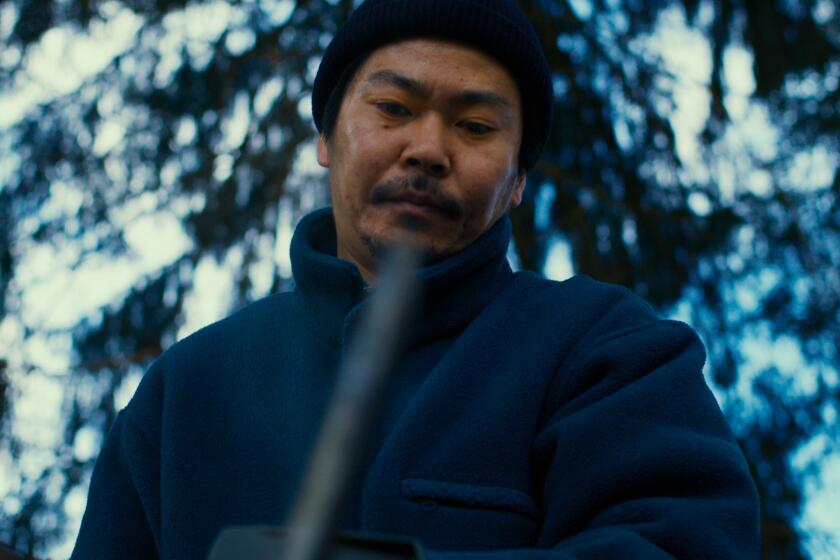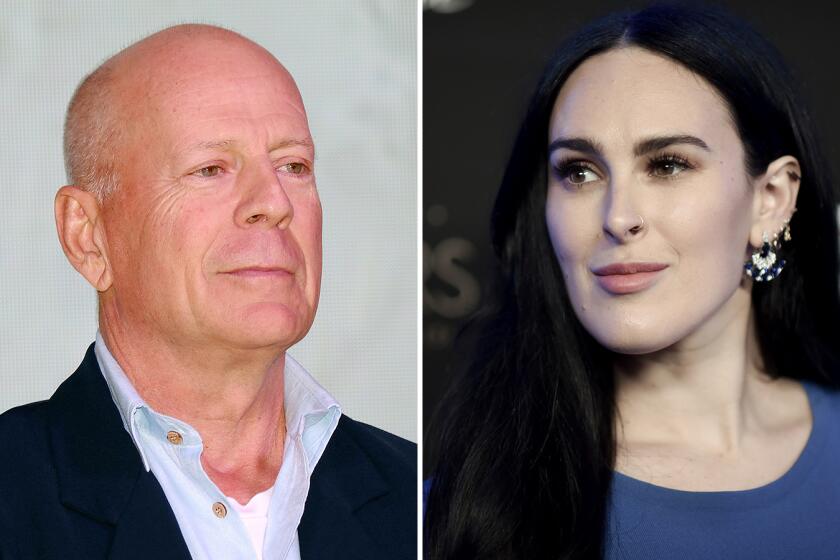The Convoluted Politics of John Ford
“The truth about my life is nobody’s damn business but my own,” film director John Ford (1894-1973) once proclaimed. This penchant for secrecy helps explain why the truth of his life has been so notoriously difficult to pin down. No aspect of Ford has generated more confusion than his often contradictory stands on political issues.
* How could it be, for instance, that the man who helped lead the Hollywood unionization movement in the 1930s and directed “The Grapes of Wrath” in 1940 ended his days supporting Barry Goldwater and Richard M. Nixon? Such ideological flip-flops have baffled admirers and detractors alike, leading to serious misunderstanding of his films.
* Ford chronicled America’s history on screen with an epic vision that spanned nearly two centuries, from the Revolutionary War to Vietnam. He explored the national mythos in his Westerns, including “Stagecoach,” “Fort Apache,” “The Searchers,” “The Man Who Shot Liberty Valance” and “Cheyenne Autumn.” He examined the shifting boundaries between history and legend and the ways that American ideals have been contradicted by historical fact, particularly where minority groups are concerned. But this rich, complex body of work defies such simplistic labels as “liberal” or “conservative.” As does Ford.
Stubbornly insisting on letting his films speak for themselves, Ford seldom gave a straight answer to questions posed by producers or interviewers. He engaged in an obfuscation strategy to protect himself from attacks and to give himself the utmost autonomy within the Hollywood system. He refused to engage in serious discussions of his feelings or the themes of his work. He also declined the label “artist”--a dodge that history has refused to accept.
*
FORD’S LEGAL NAME REMAINED JOHN FEENEY. He was the son of an Irish immigrant saloonkeeper and Democratic Party boss in Portland, Maine. During the Irish War of Independence in 1921, Ford traveled to his ancestral homeland of County Galway to give financial and moral support to cousins fighting for the Irish Republican Army against the Black and Tans. Ford’s visit lasted only a few days, ending when the British roughed him up and ordered him to leave the country. Perhaps it was the influence of his Irish heritage, with its long tradition of secrecy in the face of foreign occupation, that led him to erect such formidable barriers to his inner life.
Ford’s Irishness also helped him empathize with the dispossessed American tenant farmers of the Great Depression, who reminded him of the Irish made homeless during the Great Famine of the mid-19th century. He became an outspoken supporter of President Franklin D. Roosevelt’s New Deal programs to combat economic injustice. In 1933, when Hollywood, like the rest of the nation, was in the throes of labor unrest, Ford helped found the Screen Directors Guild (SDG). He served on the guild committee that opened negotiations with the producers and remained an officer during the guild’s first few years of existence. In 1938, he became a vice president of the newly formed Motion Picture Democratic Committee, which promoted progressive and liberal candidates. He also became involved with the Hollywood Anti-Nazi League, another broadly based coalition of leftists and liberals united by their opposition to fascism. He donated an ambulance to the Loyalists in the Spanish Civil War and helped found the Motion Picture Artists Committee to Aid Republican Spain.
In a 1937 letter to his nephew Bob Ford, who was fighting with the International Brigade in Spain, Ford wrote, “I am glad you [have] the good part of the O’Feeney blood. Some of it is very God-damned awful--we are liars, weaklings & selfish drunkards, but there has always been a stout rebel quality in the family and a peculiar passion for justice. I am glad you inherited the good strain. Politically, I am a definite socialistic democrat--always left.”
Somewhat paradoxically, this “socialistic democrat” was also a dedicated military man. Ford became a commissioned officer in the U.S. Naval Reserve in 1934 and spent his time between films from 1936 through 1941 sailing his yacht, the Araner, to Mexico and Hawaii on spying missions for the Office of Naval Intelligence (ONI). His grandson Dan Ford’s 1979 book, “Pappy: The Life of John Ford,” dismisses Ford’s spying escapades as mostly bibulous fantasizing, but recently released military records show that Ford was serious and methodical about his intelligence-gathering operations. In retrospect, his reports on Japanese military infiltration of Baja California seem alarmist, but he was reflecting a genuine concern of American military intelligence in the years leading up to World War II. The ONI found Ford’s “valuable and most interesting data” to be of “considerable importance.” At a time when isolationism was still rampant and served to inhibit Roosevelt’s foreign policy, Ford was well ahead of most Americans in his concern over the probability of war between the democracies and the fascist powers. He went on to serve in World War II, making documentaries for the Navy and the Office of Strategic Services, and retired from the Navy as a rear admiral in 1951.
*
FORD OFTEN WORE MILITARY FATIGUES AND A NAVY BASEBALL CAP with a captain’s eagle while directing his Hollywood movies after the war, many of which revolved around military themes. But in his political stands he continued marching to his own erratic drummer. During the postwar blacklist era, Ford defiantly declared, “Send the Commie bastard to me, I’ll hire him.” That remark was quoted in two books on Ford to paint the director in a heroic light as a staunch opponent of the Hollywood blacklist. And he was among the relatively few people in Hollywood who from time to time did take some principled stands against the anti-Communist witch hunt.
However, Ford’s intermittent acts of courage do not tell the whole story. His immediate response to the October 1947 hearings of the House Committee on Un-American Activities (HUAC) on alleged Communist influence in Hollywood was to head a Screen Directors Guild committee in protest. “We recognize the right of Congress to investigate,” the SDG committee announced, “but we firmly believe that an American citizen should not have his reputation attacked by anyone without the rights which we believe were the intent of the Constitution to give.”
Ford and another committee member, John Huston, went to Washington to support the “unfriendly” witnesses accused of being Communists. At the SDG board meeting on Oct. 21, Ford and William Wyler blasted director Sam Wood for telling HUAC that there had been “a constant effort” by Communists in the guild to “steer us into the Red River.” Calling Wood’s allegation “preposterous,” Ford sarcastically remarked, “Of all the pictures made in Hollywood, there is only one I have seen that smacked of Communism and followed the ‘party line’ from end to end. The little number called ‘For Whom the Bell Tolls’ [directed by Wood in 1943 from Ernest Hemingway’s novel about the Spanish Civil War]. That followed the Marxist line right on down.”
Ford’s jab at Wood for glorifying the Spanish Loyalists showed how far he had come from his own support of the Loyalist cause, and his claim that the film “smacked of Communism” also implicated its screenwriter, longtime Ford collaborator Dudley Nichols. Ford went on to criticize Wood for labeling people politically: “I object to calling names. Right and left and center of the road. There is no such thing if we live up to the context of our Constitution. I mean we’re all liberals, because it’s a liberal Constitution. Thomas Jefferson was probably the greatest of all liberals, and he was considered a leftist at that time.”
But after the studio chiefs bowed to reactionary pressure and blacklisted the Hollywood Ten, liberal opposition to the witch hunt began to collapse and people ran for political cover. During the October 1947 HUAC hearings, Ford first declared himself “a state of Maine Republican,” although he did so then (and again in 1950) only to members of his guild, not for public consumption. Ford also sought protective coloration in close political ties with his right-wing cronies John Wayne and Ward Bond, who were among the ringleaders of the blacklist through the Motion Picture Alliance for the Preservation of American Ideals (MPA). That right-wing organization, whose first president was Sam Wood, provided HUAC with much of the information on alleged film industry “Reds.” The group also zealously supplied information to the California Senate’s Tenney Committee and other witch-hunting organizations.
Ford’s active involvement with the MPA during much of the blacklist era has been largely ignored by previous Ford biographers. He lent his considerable prestige to the organization while it was helping broaden the purge of Hollywood leftists from a relatively small number of people into the hundreds. Indeed, he was one of the founders of the MPA in 1944 and remained a member as late as 1960. His papers at Indiana University’s Lilly Library include membership cards and other documentation of his involvement. Ford joined the group’s executive committee when John Wayne became president in March 1949, and Ford remained a committee member through at least 1955.
Wayne later told Dan Ford that he considered the director a moderating influence within the MPA, but Ford was playing a tricky and dangerous game. Perhaps even he did not know in the end where the dividing line of his loyalties was drawn. A striking example of Ford’s attempts to hedge his bets on the issue was his behavior during the 1950 controversy over the imposition of a mandatory anti-Communist oath for members of the SDG. A group of right-wing directors led by Cecil B. DeMille attempted to remove guild president Joseph L. Mankiewicz from office for opposing the oath. As a board member, Ford voted against the oath and vehemently opposed a plan to provide producers with the names of directors who refused to swear their loyalty to the U.S. government. In a dramatic act of leadership that became his most celebrated moment in politics, Ford played a pivotal role in stopping the Mankiewicz recall movement, but he was unable to prevent the loyalty oath from becoming part of the guild bylaws.
At the Oct. 22, 1950, SDG membership meeting to discuss the attempted recall and the blacklist, Ford introduced himself by saying, “My name is John Ford. I am a director of Westerns.” He declared, “I have been on Mr. Mankiewicz’s side of the fight all through it . . . I have been sick and tired and ashamed of the whole goddamned thing.” Reminding the members that the guild was organized to “protect ourselves against producers,” Ford denounced the plan to “give out to producers what looks to me like a blacklist. I don’t think we should . . . put ourselves in a position of putting out derogatory information about a director, whether he is a Communist, beats his mother-in-law, or beats dogs.”
Ford took on DeMille directly, telling the members, “I don’t agree with C.B. DeMille.” But he quickly began to equivocate. “I admire him. I don’t like him, but I admire him,” he said, adding praise for “C.B.’s guts and courage.” Urging that the “vilified” Mankiewicz receive an apology, Ford also suggested that a new board of directors be chosen. The Mankiewicz faction was given a vote of confidence and Mankiewicz was reelected president by the new board; Ford was named vice president. And immediately he began backtracking.
In a letter on Oct. 23, Ford commended DeMille for displaying gentlemanly behavior at the meeting. The next day, with blatant hypocrisy, Ford implied that his own speech at the meeting, and the actions of his fellow Mankiewicz supporters, had been unjust. “That meeting Sunday night,” he told DeMille, “was a disgusting thing to see--not [a] wolf pack, but a mice pack attacking you. That was your greatest performance. I just wish you could have seen yourself--a magnificent figure so far above that goddam pack of rats. I have recommended men for courage in battle, but I have never seen courage such as you displayed Sunday night. God bless you, you’re a great man. I have talked to many men in Hollywood in the last two days, including Joseph Mankiewicz, and all agree you will emerge from this greater than ever.”
Even Ford’s occasional efforts to help colleagues threatened with blacklisting were not without elements of moral ambiguity. For instance, Anna Lee, an actress who appeared in many Ford films, found herself blacklisted, despite the fact that she was a staunch conservative, after she was confused with someone of a similar name. “If it hadn’t been for Ford, I probably wouldn’t have been working now,” she recalled. “Of course, he was absolutely furious. He said, ‘They can’t do this to you.’ And he immediately called somebody in Washington, got ahold of the head guys.”
Lee emerged from the blacklist in Ford’s 1957 British film “Gideon’s Day” and returned to Hollywood for his 1958 film “The Last Hurrah.” While this story demonstrates Ford’s loyalty to a friend in trouble, it also raises disturbing questions: Why did Ford have the power to get someone off the list simply by picking up the phone? How often did he use it? Was it appropriate for anyone to be able to say if someone should or should not work? And by clearing Anna Lee, did Ford facilitate and tacitly approve the blacklisting of the woman with whom she had been confused?
*
EVEN DIRECTOR FRANK CAPRA, A LONGTIME REPUBLICAN and the maker of the U.S. Army’s “Why We Fight” series during World War II, came under suspicion because of the progressive content of his ‘30s films, his penchant for hiring liberal and leftist screenwriters, and his initial opposition to the 1947 HUAC investigation of Hollywood (a position he later reversed). When in 1951 the Defense Department denied Capra’s security clearance for Project VISTA, a think tank studying war plans at Caltech, he appealed to Ford for help. Writing the Army-Navy-Air Force Personnel Security Board that December, Ford called Capra a “truly great American” and insisted he had never heard Capra speak out against HUAC. Criticizing the investigation of Hollywood as a “publicity stunt,” Ford declared that he had opposed it “loudly and vociferously.” But in the same letter Ford went on to do some Redbaiting of his own, writing that he and Capra “joined hands in our Guild . . . when the ‘Commies,’ ‘Fellow Travelers,’ ‘Bleeding Hearts’ or whatever you want to call them, tried to infiltrate the Motion Picture Directors Guild [sic]. Together with 99% of our Guild members we waged a very successful fight and kept them out.”
Ford told the security board that Capra’s “only friends with communistic leanings was [sic] one Sidney Buchman,” the principal screenwriter of Capra’s 1939 classic “Mr. Smith Goes to Washington.” Ford demonstrated his Redbaiting proclivities again in 1953, this time against a member of his former SDG committee opposing HUAC. Ford cabled his Irish relative Lord Killanin: “Your letter received with the discouraging news that the Reds--one John Huston--are seeking refuge in our lovely Ireland. This aint [sic] good, he is not of the right wing.”
Ford did not escape having his own loyalty questioned by government agencies during the blacklist era. He had used his talent, lent his name, spoken out and contributed money for causes that many people in the postwar era had come to regard as “pinko.” His FBI file described him as having long been “a fellow traveler.” The FBI wrote that Ford’s activities in organizing the SDG put him among “a small group of motion picture directors who professed the ‘progressive’ position . . . [while] in reality the term ‘progressive’ meant sympathy for the Communist cause.” Yet a 1943 FBI report concluded that “the activities of Ford were of a mild nature, and in all probability he is an innocent.” Even so, in 1950 the U.S. Army Signal Corps briefly refused Ford access to its films because one of his former wartime subordinates had come under political suspicion.
As the blacklist’s hold on Hollywood weakened during the late ‘50s, Ford temporarily returned to his prewar liberalism. His emotional identification with fellow Irish American John F. Kennedy brought him back to the Democratic Party. Ford demonstrated his impassioned support of the civil rights movement by highlighting racial issues involving African Americans and Native Americans in such ‘60s films as “Sergeant Rutledge,” “Liberty Valance” and “Cheyenne Autumn.” But after Kennedy’s murder, the disheartened Ford, who despised Lyndon B. Johnson, switched political allegiances yet again, voting in presidential elections for Barry Goldwater and Richard Nixon (he publicly denied that, but finally admitted the truth to Katharine Hepburn in 1973). And he instinctively rallied to the lost cause of the Vietnam War.
In 1968, unable to find backing for another Hollywood feature, the 74-year-old Ford agreed to serve as executive producer of a hawkish documentary for the United States Information Agency, “Vietnam! Vietnam!” Perhaps the most troubling aspect of this little-known episode of Ford’s life is that, privately, he had a highly skeptical view of the war. After two trips to Vietnam in the fall of 1968 and the spring of 1969, Ford wrote an old friend in Maine, “What’s the war all about? Damned if I know. I haven’t the slightest idea what we’re doing there.” But Rear Adm. Ford went on supporting the war, taking a “My country, right or wrong” approach. Perhaps because he felt increasingly alienated from many of his fellow countrymen, particularly from the young people who refused to participate in a war they considered immoral, Ford identified increasingly with the embattled figure of President Nixon.
Even in the waning days of the Nixon presidency, Ford rallied unabashedly to support him. Nixon, for his part, sought comfort and reflected honor by cloaking himself in the mantle of the great filmmaker, whom he told me he considered “one of my heroes in every sense of the word.” In March 1973, Nixon presented Ford with the nation’s highest civilian honor, the Medal of Freedom. Describing Ford as both a master filmmaker and an influential “interpreter of the Nation’s heritage,” the award citation declared, “In his life and in his work, John Ford represents the best in American films and the best in America.” Nixon presented the medal during a nationally televised ceremony at which Ford also received the American Film Institute’s first Life Achievement Award.
In January 1988, Nixon sent me a fascinating four-page essay titled “Reflections on John Ford.”
“I vividly recall a telephone conversation I had with John Ford when I informed him that I was coming to California to present the Medal of Freedom to him,” Nixon wrote. “We both knew that his illness [cancer] was fatal but one would never know it from the strength of his voice and of his convictions. He was particularly moved by the scenes of the POWs coming home. He congratulated me for the strong policies which he felt had contributed to bringing them home. His last words were, ‘No amnesty for the draft evaders.’
“Some critics will say that this indicates that he was a hardhearted, bloodthirsty warmonger. They totally miss the mark. He hated war, as I did. But he knew that in Vietnam, in spite of some mistakes that were made in conducting the war, America’s goals were noble ones. He knew too that those who did their duty and went to Vietnam deserved praise, not condemnation.”
Like so many other observers before and since, Nixon saw what he wanted to see in Ford’s work. Overlooking the darker aspects of Ford’s view of American history, Nixon wrote, “John Ford in his life and in his motion pictures celebrated courage, loyalty, honor, strength, sacrifice, patriotism . . . I don’t see many Hollywood motion pictures these days and I am sure that there are some good ones. But what concerns me as I believe it would have concerned John Ford, is the tendency for many Hollywood pictures to reflect life in Hollywood rather than life in the United States. Many movies are sick because those who write, produce, direct, and act in them are sick. It just isn’t considered fashionable to portray the old virtues that John Ford stood for.”
Ford made his final political statement at the AFI tribute: “God bless Richard Nixon.” This public coda to Ford’s career dismayed many of his admirers, particularly those to the left of center. But it served as a reminder of his characteristic political unpredictability. It also underscored the importance of not viewing Ford’s powerfully complex films about American history through the narrow prism of his transient, and so often contradictory, personal political stands. If Ford never entirely resolved the issues that obsessed him, if he often seemed to dispute himself and sometimes acted against his own principles and ideals, that was part of the fuel that powered and enriched his creativity. The Irish poet William Butler Yeats could have been commenting on Ford when he wrote, “We make of the quarrel with others, rhetoric, but of the quarrel with ourselves, poetry.”
*
Adapted by the author from his forthcoming biography, “Searching for John Ford,” St. Martin’s Press, 2001.
More to Read
Only good movies
Get the Indie Focus newsletter, Mark Olsen's weekly guide to the world of cinema.
You may occasionally receive promotional content from the Los Angeles Times.






